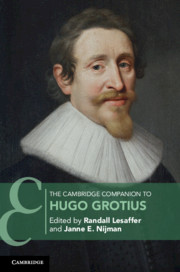Book contents
- The Cambridge Companion to Hugo Grotius
- Cambridge Companions to Law
- The Cambridge Companion to Hugo Grotius
- Copyright page
- Contents
- Contributors
- Preface
- Chronology
- Abbreviations and Short Titles of Works by Grotius
- Editions and Translations of Grotius’ Work
- Introduction
- Part I Grotius in Context
- Part II Concepts
- Part III Grotius as a Man of Letters, Theologian and Political Writer
- 14 Literary Writings
- 15 Historical Writings
- 16 Theological Writings
- 17 Political Writings
- Part IV Grotius as a Legal Scholar
- Part V The Reception of Grotius
- Index
- References
16 - Theological Writings
from Part III - Grotius as a Man of Letters, Theologian and Political Writer
Published online by Cambridge University Press: 03 September 2021
- The Cambridge Companion to Hugo Grotius
- Cambridge Companions to Law
- The Cambridge Companion to Hugo Grotius
- Copyright page
- Contents
- Contributors
- Preface
- Chronology
- Abbreviations and Short Titles of Works by Grotius
- Editions and Translations of Grotius’ Work
- Introduction
- Part I Grotius in Context
- Part II Concepts
- Part III Grotius as a Man of Letters, Theologian and Political Writer
- 14 Literary Writings
- 15 Historical Writings
- 16 Theological Writings
- 17 Political Writings
- Part IV Grotius as a Legal Scholar
- Part V The Reception of Grotius
- Index
- References
Summary
Grotius’ earlier theological controversies concerned the authority of secular rulers and the normative status of the undivided church, principles given fullest exposition in De Imperio Summarum Potestatum. Meletius reveals deeper disagreements with the prevailing Calvinism, insisting on the distinction of core doctrines from theological speculations. The atoning death of Christ, expounded in De Satisfactione Christi, was of central importance to him, and his apologetic interest flowered in De Veritate Christianae Religionis, an exercise in natural theology. The later writings centre on his Bible Commentary and his writings on Christian unity. They reveal some changes upon earlier views, but no accommodation to Catholic doctrinal norms. The polemics with Rivet sharpened his opposition to Calvinism as a dogmatic system with an inadequate conception of the Christian moral life. His status as a layman of no church establishment exposed him to appropriation in support of later agenda that were not his. But his influence was widespread in later Protestantism of many strands.
Keywords
- Type
- Chapter
- Information
- The Cambridge Companion to Hugo Grotius , pp. 339 - 363Publisher: Cambridge University PressPrint publication year: 2021



